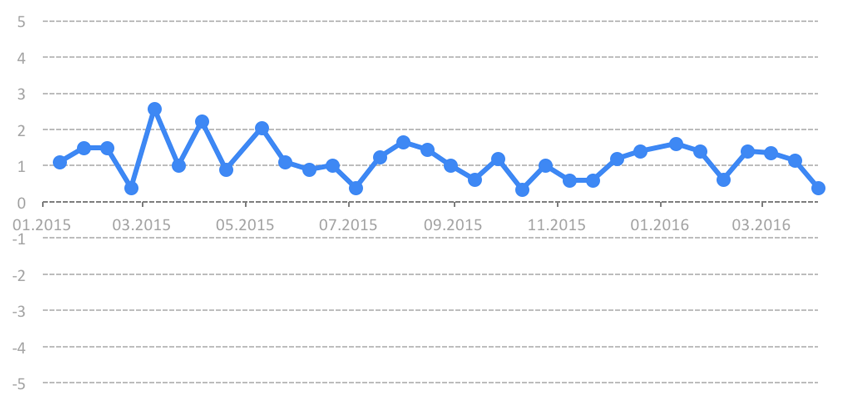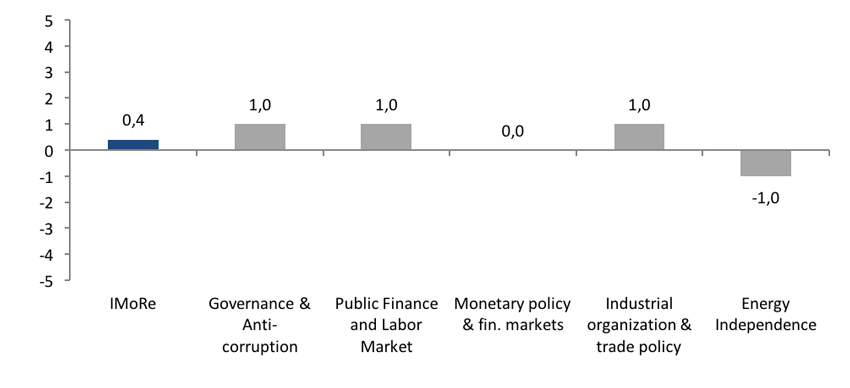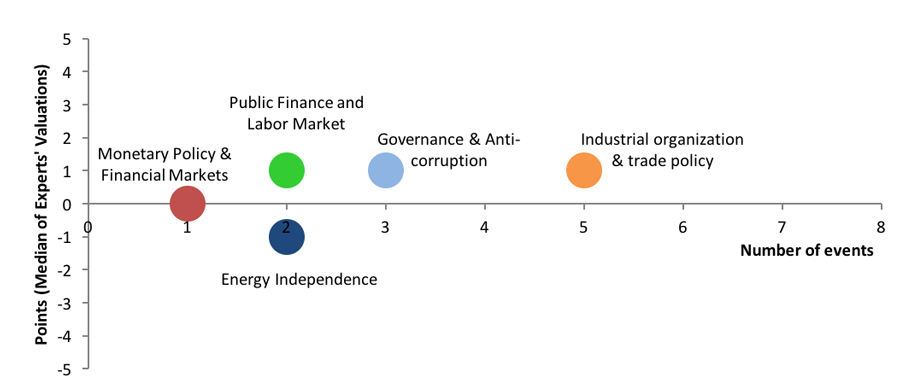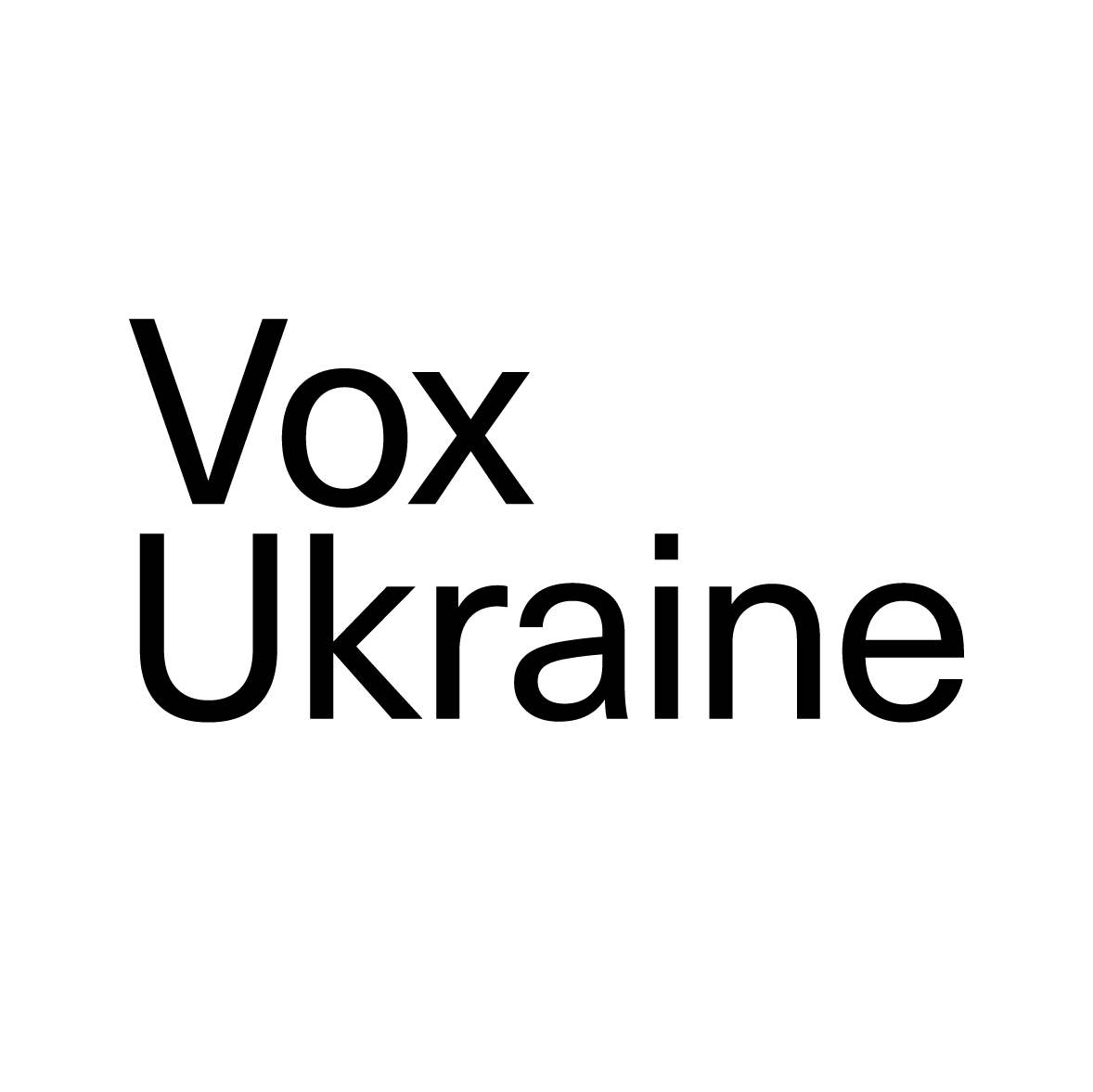Reform Index aims to provide a comprehensive assessment of reform efforts by Ukraine’s authorities. Reform Index is based on expert assessments of changes in the regulatory environment in five areas. Reform Index decelerated to +0.4 point in late March – early April (possible range from -5.0 to +5.0) from previous level of +1.2 points. This is one of the lowest values for the entire monitoring period from the beginning of 2015.
Chart 1. Reform Index dynamics
Reform Index team considers index value of at least 2 an acceptable pace of reform
Chart 2. Reform Index and its components in the current round
Experts noted some positive steps in fighting corruption, improving the efficiency of public expenditure and promoting competition. Positive steps include implementation of social benefits verification, changes to the Land Code on land auctions, elimination of corruption schemes in the processing of waste oils. At the same time, against the background of political crisis, the government decided to postpone second stage hike in gas tariffs for population. The decision was negatively assessed by experts and raised concerns of growing populism in policy making.
Anti-reform
1) Cabinet of ministers deferred a decision on gas tariffs for households and heating companies for a month: -1.0 point
According to the agreement between Ukraine and the IMF, Ukraine is obliged to increase gas tariffs for households and heating companies to market level in several stages. Consecutive price hike was scheduled for April 1, and its postponement (CMU decree 234 from 30.03.2016) is a violation of the program terms.
The delay with the establishment of tariffs means lack of political will to continue reforms in the gas sector. On the other hand, lower import prices permit not to raise gas prices to the level originally planned, and the government took a wait-and-see stand to minimize the political damage.
Denis Sakva, investment company Dragon Capital
Bringing gas tariffs to market levels is positive in terms of reducing fiscal deficit, diminishing incentives for corruption and encouraging energy saving.
The most important positive developments
2) CMU decrees on the social payments verification: +3.5 points
Thanks to the CMU decrees (136 and 137 of 18.02.2016, 168 of 14.03.2016, 185 of 11.02.2016) the Ministry of Finance will start verification of social benefits in 2016. Verification is aimed at increasing efficiency of social security spending. It will help to identify fraud and better assist those who are truly in need.
Ukraine does not have a single register of social payments beneficiaries. Therefore, at the first stage of verification process the Ministry of Finance will synchronize registers run by different state agencies – the Ministry of Social Policy, the Ministry of Justice, the Migration Service and others. Next steps will include verification of documents for authenticity and bank accounts of citizens receiving pensions and social benefits.
At the current stage verification is extremely necessary in Ukraine to confront the abuse of pensions or social assistance by population. According to official estimates, it can help the government to save about UAH 5 billion this year, though these estimates may prove optimistic. On a clearly positive note, the verification process will improve cooperation between different state agencies: the Ministry of Finance, the Security Service, the Ministry Social Policy, the Pension Fund, the State Fiscal Service. This cooperation will be useful in the future, considering that the long-awaited and desired transition to the targeted social assistance requires sharing of data between them on a constant basis.
Oleksandra Betliy, the Institute for Economic Research and Policy Consulting
3) Amendments to the Land Code of Ukraine on holding land auctions: +2.0 points
The law (1012-VIII of 18.02.2016) reduces the list of cases when land plots owned by the central or municipal authorities are sold or rented without auctions. These amendments reduce corruption risks and improve land auction procedure. The law still implies that the cost of preparing bids for the land auction are incurred by an organizer or executor of the auction and is reimbursed by the winner of the auction. But such procedure is spelled out clearer helping to rely charges on executors – a reasonable decision given constant lack of funds in local budgets.
4) Anti-corruption amendments to regulations on oil recycling: +1.5 points
The previous order of oil recycling created vast opportunities for corruption, as processing contracts were given to firms that had no corresponding production capacities. Money paid by importers and manufacturers to these firms settled in the pockets of corrupt officials and waste oils were not disposed properly.
Now processing of waste oils may be conducted only by those companies that have the necessary production capacity and meet the safety requirements (the CMU decree 1198 from 25.11.2015 was published only in April 2016). Importers can select waste oil processors independently or to conduct processing by themselves. Disposal is considered completed only on the fact of waste processing and not on the fact of payment, as it happened before.
Reform Index aims to provide a comprehensive assessment of reform efforts by Ukraine’s authorities. The Index is based on expert assessments of changes in the regulatory environment in five areas:
- Governance and Anti-Corruption
- Public Finance and Labor Market
- Monetary Policy and Financial Markets
- Industrial Organization and Foreign Trade
- Energy Independence
For details please visit reforms.voxukraine.org
Chart 3. Value of Reform Index components and number of events March 21 – April 3, 2016
Main media partner Project partners

Attention
The authors do not work for, consult to, own shares in or receive funding from any company or organization that would benefit from this article, and have no relevant affiliations






